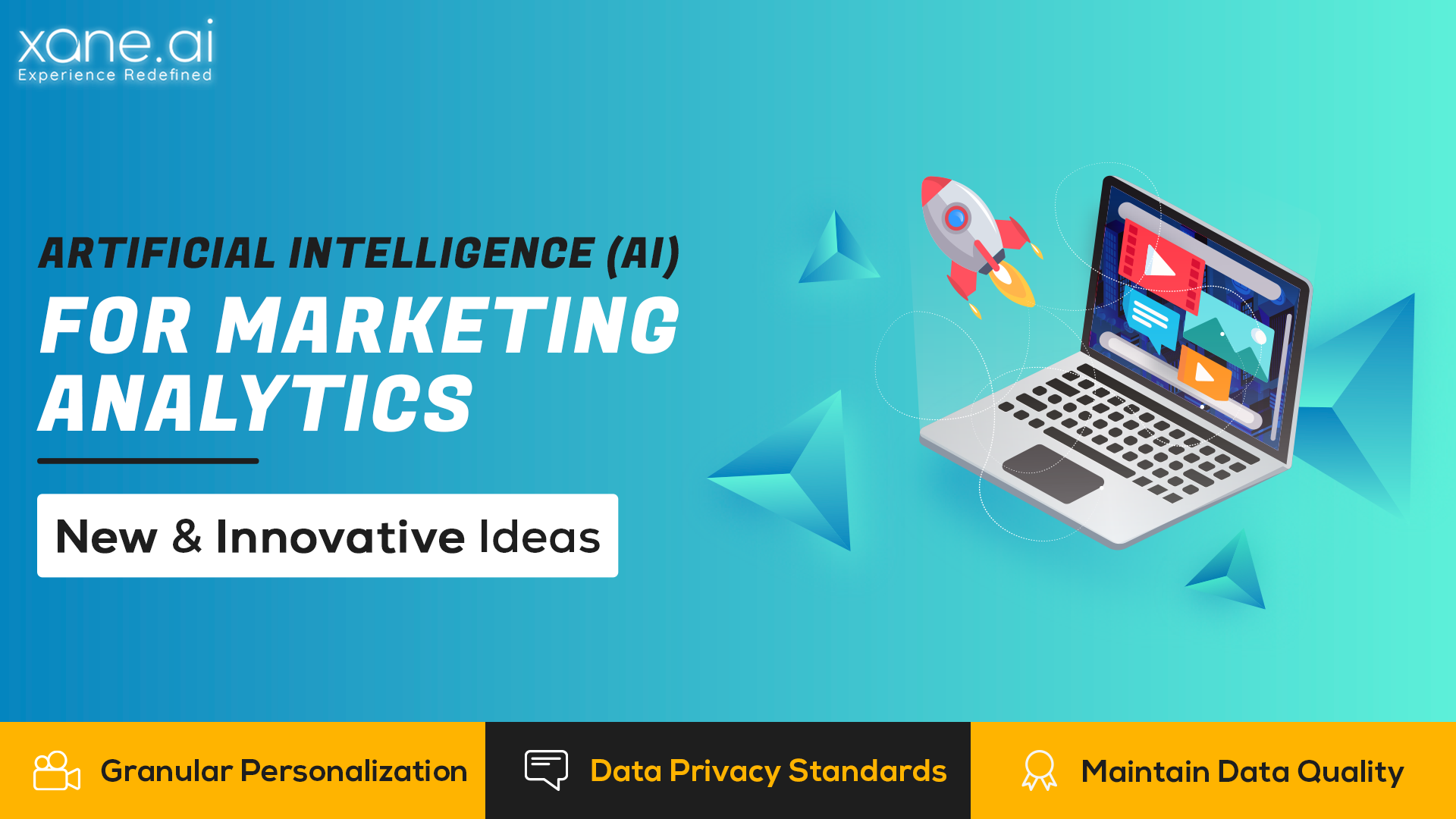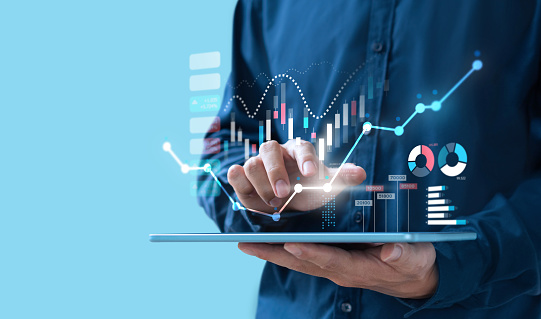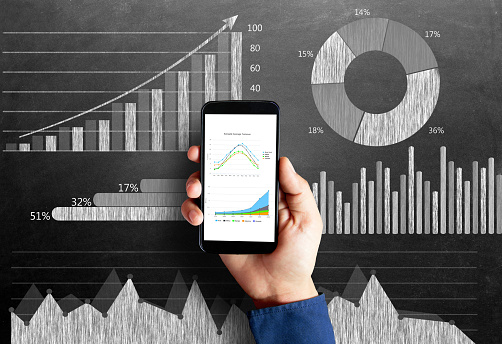
08 Jun Using Artificial Intelligence for Marketing Analytics
Blog by Oluwasegun Oke
Artificial Intelligence happens to have crossed over many skeptical beginnings, from being a science fiction’s number concept to being a dominant force, in today’s human existence. Talk about marketing analytics, then next is to get ready and invest in AI-powered tools, that can amplify your curiosity, and provide long-lasting alternative solutions. AI is at the forefront of any sincere marketing effort to turn around businesses, as it avails marketers the opportunity to take their careers up a notch, by changing preconceived perceptions of how they do business. This stepping-up made possible by AI engages target audiences, automates processes, and massively improves turnovers, through marketing performance analysis. But first, what does marketing analytics really mean? Let’s dive in!
Marketing Analytics
Marketing analytics encompasses the usage of AI-powered algorithms, together with human intelligence to better understand a failed, average, and/or successful marketing campaign, by generating marketing performance reports of the methods and channels applied, in order to develop best-fitted solutions, and improve on subsequent marketing campaigns. It is no use prevailing on waiting for scarce resources on trial and error, as inbound marketers and business owners alike, are now awoken to the importance of leaving behind inundated methods, including enraging their intuitions, and most importantly to have access to marketing analytics after every campaign, in order to better understand customer behaviour, and most especially adjust subsequent campaigns to avert financial recklessness.
Looking back at the beginning of this concept, the closest to the present AI-central marketing result performance x-ray tool, was prone to errors, one-dimensional, preprogrammed, and often predisposed to argument, and partly under the microscope. But apparently, AI has genuinely put out there once more, another cutting-edge tool that is not just helping businesses to fully scan, extract and solve complex sales-focused challenges, and adapt to internal and external challenges, but is also increasingly guaranteeing better customer experience, while improving both perspectives and turning out quality insights. To sum up, there is no cause for alarm, nor red flags, watch out for, when it comes to adopting AI-powered marketing analytics solutions, for performance measurement.
This is the sole reason why the number of professional marketing analytics platforms has skyrocketed from being under 230 in 2017, to over a staggering 6000, in just four years. The same reason has caused subscription fees to be significantly reduced, such that even small and medium enterprises can now afford and have access to the strong tools of AI-powered marketing analytics.
Why AI-Powered Marketing Analytics Remains a Dominant Force for Businesses
With so much data to be analysed, processed, and extracted for insights, which then becomes facts that human intelligence can interpret over a short period of time, to develop tailor-made marketing strategies, artificial intelligence is best suited to integrate and automate these diverse and complex parameters, for a successful marketing campaign.
Also, given the accuracy and spontaneity of machines to handle a huge amount of data, with zero errors, while saving valuable time, it makes much sense for inbound marketers to keep to AI-automated analytics reports, as against traditional types.
This improves the level of the customer base, by converging every prospect lead, gathered from a wide range of marketing channels, unlike traditional methods that only rely on bulk-sending of email promos and tiresome human-coordinated analytics results, leaving once more, a huge margin for unforgettable errors. With all these avoidable shortcomings, the quality of campaigns results is embedded with inconsistencies, counting against all inherent time-intensive techniques, and brands envisioned revenues.
Ten ways AI is Safeguarding the Result-Oriented Approach and Authenticity of Marketing Analytics
Since AI performs best empowering every stakeholder who relies on its well-established yet sufficiently powered tools to integrate marketing processes and generate insights. It makes interactions of deduced analytics facts to be easily attainable (having been streamlined). Then the smallest undoings, in marketing analytics, are extracted through analysis, interpretation, and correction, by falling back to human intelligence. To this end, it becomes obvious that both artificial intelligence and human intelligence is mandatory. So next, we will discuss how AI-inspired marketing analytics remains a dominant force, against a traditional platform.
AI-Powered tools Improve Marketing Analytics Quality
Since AI-trained algorithm models can handle a huge amount of data, when it comes to collecting potential customers’ queries, from a wide range of marketing channels, and filtering them to extract qualified leads, for insights that can generate higher conversions and improve marketing analytics quality. With this, you may not require marketing experts to interpret the analytics reports, implement the interpreted marketing strategies, and skyrocket subsequent campaigns sales.
AI-powered Predictive Analytics Tools
Another branch of AI (deep learning), which is made up of artificial brains of neuron-like structures, formed into a series of separate layers, joined together through nuclei, to create spontaneous, flexible algorithmic models, with high robotic behavioral patterns or humanoid intelligence. This ensures that subsequently gathered marketing analytics outcomes (behavioral patterns) can be effectively studied by algorithms models to accurately predict the best and appropriate future investment. Therefore, being equipped with AI-inspired marketing analytics tools can super-lead your company’s visions, with an upper hand to defeat the competition, and upgrade sales targets.
The automated processes also depict zero susceptibilities to human errors, since artificial intelligence was first excited, with a high degree of spontaneity, flexibility, creative capacity, and quality pipe-networks streamlining of collected insights, as general facts which end up as analytics reports, to be applied in predicting future market trends.
AI is Leading Personalisation of B2B Products and Services.
By constantly engaging customers through AI-developed tools, such as Chatbots, bots, Automated emails, voice assistants, and other information interphase acquisition systems, a large amount of raw and valuable data sets are accumulated, filtered, transferred, and collected for thorough marketing analysis.
And then fragmented into their separately distinct segments, as insights. Insights are used to decide what type of marketing strategy best fits each segment. With this initiative in place, every step of each marketing campaign is optimised to generate a large number of sales. As a result of targeting only customers who are willing and able to rise to the business or brands campaigns, by purchasing advertised services and/or products.
We should keep in mind, that each distinct customers segment, is arrived at by using AI to study previously generated features of customer behaviours, which are then recognised collectively, to both identify inherent similarities and differences. And by permeating or sifting deep down into each data set, it streamlines or carries out their separations, into a variety of regular segments, according to similarities.
Instant Feedback
The transformative and highly efficient natural language processing automation through AI ensures that customer support is strongly elevated beyond average limits. By this, customers are kept in the loop about new products or services, and faqs are easily available to address and answer unique customers’ questions. This AI automated feedback does enhance confidence in all aspects while advancing a better customer experience.
AI Simplifies and Improves Algorithms Modeling Processes
What used to be a time-consuming activity, has now taken an interestingly dynamic course and shape. When we look back at traditional modeling techniques, with intense manual efforts, which may take an error-ridden dimension. We are able to see why AI is more than a buzzword, considering the ease and pace at which it trains new algorithms models and creates intelligent machines, that can learn, unlearn, and cut across new marketing disciplines, while maintaining a framework that makes each step of understanding customers and amassing a large amount of revenue, a walk in the park
AI Sets Criteria For Models
End results of training and developing AI-powered algorithm models are often subjected to instant rigorous scrutiny by comparing them with benchmarks, hence ensuring new AI models are fit enough to specifically and efficiently automate and perform behavioural – inclusive tasks. Plus every newly produced model must be measured against correlated benchmarks, in order to get what we know as perfectly defined AI tools, with model characteristics that are uniquely extensive and deeply immersive.
Every Stage in Marketing Analytics is Trackable Using AI
Traditional marketing analytics can only be tracked at the end of every campaign, which anyway, may add up to five months or more. On balance, this constitutes a major barrier and impedes set objectives from a large-scale perspective. Let’s consider a case study where close to 5 billion dollars is at stake. It brings us back to AI’s algorithms’ power to scan the entire frameworks of any data sets, recognise patterns and identify inherent inconsistencies, within a relatively shorter span. With this, your project needs not to hang on to only human impulses or trial and error standpoints, in order to resonate with target audiences, advance qualified leads, and generate authentic marketing analytics reports.
Optimising Marketing Campaigns
Instead of technically keeping your customers at bay, by starting off interpreting traditional marketing analytics, thereby embracing error-prone procedures, and applicable formulas. On the other hand, it is indeed time-saving and revenue-wise to adopt correlated AI-inspired marketing designs, filtered and stripped away from previous poor performance, to optimise your set marketing objectives, and be rewarded with an edge.
AI Promotes Streamlined Advertisement for Specific Audiences
Being exposed to advertising strategies that failed to resonate with audiences, surely amount to wastages, for such marketers and further decline the prospects and usage of such traditional signatures. However, to put things correctly, on the other end, advertising in the world of AI is nothing about creativity, but meeting the specific needs or requirements of your target audiences. And these include analyzing marketing analytics reports and implementing correlated marketing initiatives to boost sales.
AI Facilitates Customised Reports
AI ensures that clients have constant access to generated marketing analytics reports at every stage of the marketing process, such that they get instantly corresponding feedback, and be kept abreast of every development. This way, various options emerge, to further streamline campaigns, with accelerated efforts, focused mainly on reaching target audiences and converting qualified prospects.









